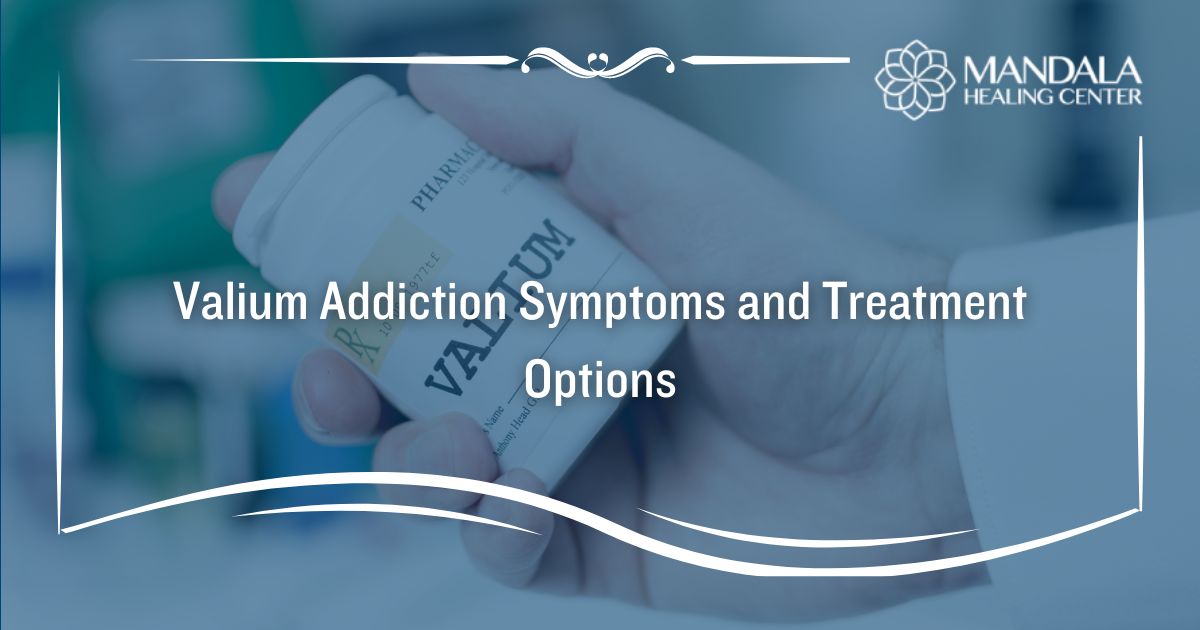Benzodiazepines are a class of prescription drugs that decrease abnormal activity in the central nervous system. They are most often used to treat anxiety, insomnia, panic disorders, and seizure conditions. Benzodiazepines, while capable of managing these conditions, have a known reputation for being incredibly addictive.
According to the National Library of Medicine (NLM), 17.2% of people who use benzodiazepines are abusing them.[1]
The most commonly discussed benzodiazepines are Xanax (alprazolam) and Klonopin (clonazepam). However, individuals frequently abuse other types of benzodiazepines. For example, people abuse Valium (diazepam) to experience a drowsy and euphoric high. Long-term and regular benzodiazepine abuse can quickly lead to an addiction.
The most common symptoms of Valium addiction include using more than you are prescribed, having a hard time controlling how much you consume, developing a tolerance, and experiencing withdrawal symptoms when you cannot use it. While Valium addiction can be difficult to overcome, there are tons of treatment options available, such as medical detox, inpatient rehab, and outpatient treatment.
What is Valium?
Valium is the name brand for a benzodiazepine medication called diazepam. Most commonly, it is prescribed to treat anxiety. It may also be used to treat alcohol withdrawal symptoms during a medical detox program.
Even though Valium can be effective for short-term management of anxiety or alcohol withdrawal, it should never be a long-term solution. Valium is habit-forming, which means using it longer than a couple of weeks will result in addiction. Unfortunately, Valium addiction can be life-threatening when left untreated.
The side effects of Valium include:[2]
- Drowsiness and dizziness
- Lethargy or tiredness
- Muscle weakness
- Headaches
- Dry mouth
- Nausea
- Constipation
- Confusion
- Urinary issues
- Changes in sex drive or ability
The Signs and Symptoms of Valium Addiction
When someone is addicted to Valium, that means they are having a hard time controlling how much they use it and are physically dependent on it. To determine whether you need professional help from a drug rehab program, you should be aware of the signs and symptoms of Valium addiction.
The common symptoms of Valium addiction include:
- Running out of prescriptions early or taking more Valium than you are prescribed
- Going to multiple doctors to receive more than one prescription of Valium at a time
- Using Valium to experience a high
- Frequent signs of drowsiness and lethargy
- Unsteadiness on feet and slurring of words
- Sleeping far more than usual
- Changes in eating patterns
- Combining Valium with other drugs or alcohol
- Losing interest in previously enjoyed activities and withdrawing socially
- Failing to meet responsibilities at work, school, or home because of Valium misuse
- Needing to use higher doses of Valium to experience the desired effect
- Experiencing a Valium overdose (characterized by respiratory depression)
- Experiencing withdrawal symptoms when you cannot use Valium
While Valium addiction can take over your life, it is possible to recover with a bit of professional help. Treatment centers like Mandala Healing Center can offer you the comprehensive care you need to achieve long-term sobriety.
What are the Treatment Options for Valium Addiction?
If you or a loved one struggles with Valium addiction, knowing the treatment options that are available to you can motivate you to seek help. Typically, people who receive treatment for Valium addiction attend medical detox, inpatient rehab, and outpatient treatment as a continuum of care. However, you are allowed to use only one form of treatment if that suits your needs.
Medical Detox
Medical detox should always be the first step in recovery from Valium addiction. Benzodiazepines can cause severe withdrawal, including physical and psychological symptoms like psychosis and seizures, making it vital that you receive medical intervention to ensure your safety.
During a medical detox program, you will be given medication to limit the symptoms of Valium withdrawal. Typically, this involves the use of another benzodiazepine. Your dose will be slowly tapered over time to ensure your body adjusts to the absence of Valium safely and comfortably.
Inpatient Rehab
Once you complete medical detox, you have the option to enter an inpatient rehab program. Also known as residential treatment, these programs are a great Valium addiction treatment option. They require you to live in the facility for 30 to 90 days depending on your needs.
You will receive 24/7 monitoring and care, evidence-based therapies, psychoeducational support groups, holistic treatments, relapse prevention planning, and aftercare services to ensure you develop a strong foundation of recovery.
Outpatient Treatment
You can either use outpatient treatment as a standalone treatment option or transition into one of these programs after you complete inpatient rehab. As the name suggests, outpatient addiction centers allow you to live in the comfort of your own home while you commute to treatment sessions a few times per week.
The intensity and frequency of your treatment will depend on what type of outpatient program you choose and the severity of your drug abuse. The options (in order of level of care) include:
- Partial hospitalization programs (PHPs)
- Intensive outpatient programs (IOPs)
- Outpatient programs (OPs)
Find Help for Valium Addiction
If you or a loved one struggles with Valium addiction, Mandala Healing Center is here to help get started on the road to recovery. We offer a continuum of care that includes medical detox services, ensuring that you have access to everything you need to recover from your substance use disorder. Additionally, we can help you address any co-occurring mental health disorders you struggle with.
To learn more about our Valium rehab program, contact us today.
References:
-
- The National Library of Medicine (NLM): Benzodiazepine Use and Misuse Among Adults in the United States, Retrieved January 2024 From https://www.ncbi.nlm.nih.gov/pmc/articles/PMC6358464/
- Medline Plus: Diazepam, Retrieved January 2024 From https://medlineplus.gov/druginfo/meds/a682047.html












